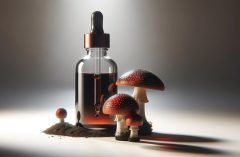Table of Contents
 Psilocybin, the psychoactive compound in magic mushrooms, has garnered attention not only for its potential therapeutic benefits but also for its complex legal status worldwide. The legal landscape of psilocybin is evolving, with various regions decriminalizing or legalizing its use. This article explores the current legal status of psilocybin across different regions, highlights the social and political movements driving these changes, and provides updates on ongoing efforts to decriminalize or legalize psilocybin.
Psilocybin, the psychoactive compound in magic mushrooms, has garnered attention not only for its potential therapeutic benefits but also for its complex legal status worldwide. The legal landscape of psilocybin is evolving, with various regions decriminalizing or legalizing its use. This article explores the current legal status of psilocybin across different regions, highlights the social and political movements driving these changes, and provides updates on ongoing efforts to decriminalize or legalize psilocybin.
Current Legal Status of Psilocybin and Magic Mushrooms
North America
United States
In the United States, psilocybin remains classified as a Schedule I substance under the Controlled Substances Act, indicating it is illegal and considered to have no accepted medical use. However, several cities and states have taken steps toward decriminalization and legalization:
– Denver, Colorado: In 2019, Denver became the first city in the U.S. to decriminalize psilocybin mushrooms, meaning law enforcement prioritizes the enforcement of psilocybin possession laws among the lowest
– Oakland and Santa Cruz, California: Following Denver’s lead, these cities decriminalized possessing and using psilocybin mushrooms in 2019 and 2020, respectively.
– Oregon: In 2020, Oregon became the first state to legalize the therapeutic use of psilocybin with Measure 109, which allows regulated medical use under the guidance of trained facilitators.
– Washington, D.C.: In 2020, voters passed Initiative 81, decriminalizing the possession and use of psilocybin and other entheogenic plants.
Canada
In Canada, psilocybin is regulated under the Controlled Drugs and Substances Act, making it illegal to possess, sell, or produce. However, exemptions are granted for medical and research purposes:
– Exemptions: Health Canada has granted several exemptions to patients with terminal illnesses, allowing them to use psilocybin for therapeutic purposes.
– Clinical Trials: Researchers can apply for exemptions to conduct clinical trials exploring the therapeutic potential of psilocybin.
Europe
Netherlands
The Netherlands is known for its relatively permissive stance on psilocybin, specifically in the form of “magic truffles,” which are sclerotia-containing psilocybin. While psilocybin mushrooms are illegal, magic truffles can be legally purchased and consumed.
Portugal
Portugal decriminalized all drugs, including psilocybin, in 2001. While the possession and use of psilocybin are not legal, individuals caught with small amounts for personal use are not subject to criminal prosecution but rather administrative penalties such as fines or community service.
Spain
In Spain, the sale of psilocybin mushrooms is illegal, but personal use and possession are not criminalized. This legal gray area allows for the personal cultivation and consumption of psilocybin mushrooms without legal repercussions.
Oceania
Australia
Psilocybin is classified as a prohibited substance in Australia, making its possession, sale, and use illegal. However, recent developments indicate a shift towards medical research:
– Victoria and New South Wales: Researchers have been granted permits to conduct clinical trials investigating psilocybin-assisted therapy for mental health conditions.
New Zealand
Psilocybin is a Class A controlled drug in New Zealand, meaning it is illegal to possess, use, or distribute. Efforts to reclassify psilocybin for medical use are ongoing but have not yet resulted in legislative changes.
Social and Political Movements Driving Legal Changes in Magic Mushrooms
Advocacy Groups
Various advocacy groups have been instrumental in pushing for the decriminalization and legalization of psilocybin. Organizations such as Decriminalize Nature and the Multidisciplinary Association for Psychedelic Studies (MAPS) have raised awareness about the potential benefits of psilocybin and lobbied for policy changes.
Public Support
Public support for the decriminalization and legalization of psilocybin has grown, driven by increasing awareness of its therapeutic potential. High-profile endorsements and positive media coverage have shifted public perceptions and reduced stigma.
Legislative Efforts
Lawmakers in various regions are introducing bills to decriminalize or legalize psilocybin. These efforts are often supported by scientific research highlighting psilocybin’s safety and efficacy in treating mental health disorders.
Ongoing Efforts and Future Directions
Research and Clinical Trials
Continued research and clinical trials are crucial for advancing the understanding of psilocybin’s therapeutic potential. Positive outcomes from these studies could pave the way for broader acceptance and regulatory approval.
Policy Reforms
As evidence supporting the benefits of psilocybin grows, more regions are likely to consider policy reforms. Decriminalization and legalization efforts will likely continue to gain momentum, influenced by successful models in places like Oregon and the Netherlands.
Global Perspective
International cooperation and knowledge sharing will be essential for harmonizing psilocybin policies and ensuring safe and equitable access. The experiences of early adopters can inform best practices and guide future regulatory frameworks.
Conclusion
The legal landscape of psilocybin (Magic Mushrooms) is rapidly evolving, with a growing number of regions decriminalizing or legalizing its use. Driven by advocacy, public support, and promising research, the movement towards recognizing the therapeutic potential of psilocybin is gaining traction. As efforts continue, it is crucial to balance the benefits of psilocybin with considerations for safety and regulation, ensuring that its integration into society is both responsible and beneficial.
—
This article aims to provide a thorough understanding of psilocybin’s (Magic Mushrooms) legal status and the factors influencing its evolving landscape, offering valuable insights for readers interested in the legal and therapeutic aspects of magic mushrooms.
More on Magic Mushrooms in Spinfuel:
The Comprehensive Guide to Psilocybin: Benefits, Risks, and Therapeutic Uses in 2024





